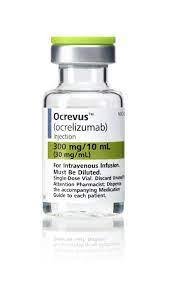Ocrevus Disease Interactions
There are 4 disease interactions with Ocrevus (ocrelizumab).
Ocrelizumab (applies to Ocrevus) hepatitis B
Major Potential Hazard, Moderate plausibility. Applicable conditions: Infectious Hepatitis
The use of ocrelizumab is contraindicated in patients with an active hepatitis B virus (HBV) infection. Patients should be screened for HBV prior to treatment initiation. It is recommended to consult a liver disease expert before starting and during treatment with ocrelizumab in patients who are negative for surface antigen [HBsAg] and positive for HB core antibody [HBcAb+] or are carriers of HBV [HBsAg+].
Ocrelizumab (applies to Ocrevus) breast cancer
Moderate Potential Hazard, Moderate plausibility. Applicable conditions: Neoplasia -- Estrogen Dependent
Ocrelizumab may increase the risk of malignancies, including breast cancer. It is recommended to follow standard breast cancer screening guidelines. Exercise care when using this agent in patients with a history of breast cancer or other type of malignancy. Monitor closely for the development of any sign or symptom suggestive of a malignancy and treat appropriately.
Ocrelizumab (applies to Ocrevus) infections
Moderate Potential Hazard, Moderate plausibility. Applicable conditions: Infection - Bacterial/Fungal/Protozoal/Viral
Ocrelizumab may increase the risk for upper respiratory tract infections, lower respiratory tract infections, skin infections, and herpes-related infections. It is recommended to delay the use of ocrelizumab in patients with an active infection until the infection is resolved.
Ocrelizumab (applies to Ocrevus) vaccination
Moderate Potential Hazard, Moderate plausibility.
The use of live-attenuated or live vaccines is not recommended during treatment with ocrelizumab and until B-cell repletion is confirmed. It is recommended to administer all immunizations according to immunization guidelines at least 4 weeks prior to initiation of ocrelizumab for live or live-attenuated vaccines and, whenever possible, at least 2 weeks prior to initiation of treatment for non-live vaccines. Ocrelizumab may interfere with the effectiveness of non-live vaccines.
Switch to professional interaction data
Ocrevus drug interactions
There are 441 drug interactions with Ocrevus (ocrelizumab).
More about Ocrevus (ocrelizumab)
- Ocrevus consumer information
- Check interactions
- Compare alternatives
- Pricing & coupons
- Reviews (181)
- Drug images
- Side effects
- Dosage information
- Patient tips
- During pregnancy
- Support group
- FDA approval history
- Drug class: CD20 monoclonal antibodies
- Breastfeeding
- En español
Related treatment guides
Drug Interaction Classification
| Highly clinically significant. Avoid combinations; the risk of the interaction outweighs the benefit. | |
| Moderately clinically significant. Usually avoid combinations; use it only under special circumstances. | |
| Minimally clinically significant. Minimize risk; assess risk and consider an alternative drug, take steps to circumvent the interaction risk and/or institute a monitoring plan. | |
| No interaction information available. |
See also:
Further information
Always consult your healthcare provider to ensure the information displayed on this page applies to your personal circumstances.


